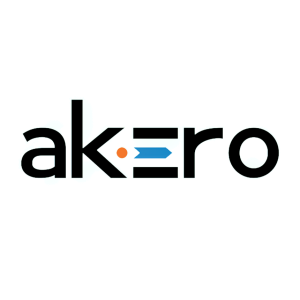Akero Therapeutics Presents Week 96 Results from Phase 2b SYMMETRY Clinical Trial of Efruxifermin in Patients with Compensated Cirrhosis Caused by MASH Showing Fibrosis Improvement without Worsening of MASH at the EASL Congress 2025
Rhea-AI Summary
Positive
- 39% of patients treated with EFX 50mg showed fibrosis improvement vs 15% for placebo (p=0.009)
- Treatment effect more than doubled from Week 36 to Week 96 (10% to 24% placebo-adjusted)
- Consistent efficacy across patient subgroups regardless of diabetes status or medication use
- Safety profile remained favorable with mainly mild to moderate side effects
Negative
- Primary endpoint at Week 36 did not achieve statistical significance
- Most common adverse events included gastrointestinal issues (diarrhea, nausea, increased appetite)
News Market Reaction – AKRO
On the day this news was published, AKRO declined 5.99%, reflecting a notable negative market reaction.
Data tracked by StockTitan Argus on the day of publication.
SOUTH SAN FRANCISCO, Calif., May 09, 2025 (GLOBE NEWSWIRE) -- Akero Therapeutics, Inc. (Nasdaq: AKRO), a clinical-stage company developing transformational treatments for patients with serious metabolic diseases marked by high unmet medical need, presented results from the Phase 2b SYMMETRY trial demonstrating the potential of efruxifermin (EFX) to improve fibrosis in compensated cirrhosis (F4) caused by metabolic dysfunction-associated steatohepatitis (MASH), in a late-breaking oral presentation at the European Association for the Study of the Liver (EASL) Congress 2025 taking place May 7-10, in Amsterdam, the Netherlands.
“Compensated cirrhosis due to MASH remains a high unmet medical need, leaving patients with a poor prognosis and currently no effective treatment options beyond liver transplant,” said Kitty Yale, chief development officer of Akero. “These data presented at the EASL Congress 2025 differentiate EFX from other approved or investigational MASH treatments as the first to demonstrate fibrosis reversal in patients with MASH caused by cirrhosis. We look forward to continuing evaluation of EFX across all stages of MASH in our Phase 3 SYNCHRONY program.”
“Patients with cirrhosis caused by MASH could face a 50 percent chance of dying within five years without a liver transplant,” said Mazen Noureddin, M.D., Professor of Medicine and Transplant Hepatologist at Houston Methodist Hospital, and principal investigator for the SYMMETRY study. “EFX’s powerful anti-fibrotic activity, as observed in the Phase 2b SYMMETRY trial and currently being evaluated in Phase 3, has the potential to be the most substantial medical breakthrough in my career as a treating physician.”
Week 96 data presented from SYMMETRY, a Phase 2b trial evaluating the efficacy and safety of Akero’s lead product candidate, EFX, in patients with biopsy-confirmed compensated cirrhosis (F4) due to MASH, showed fibrosis reduction without MASH worsening by both completer and intent-to-treat (ITT) analyses after 96 weeks. In the pre-specified analysis of patients with baseline and week 96 biopsies (N=134),
Summary of Week 96 Fibrosis Improvement without MASH Worsening Secondary Endpoint
| Primary Analysis (N=134)1 | ITT Analysis (N=181)2 | |||||
| Histology Endpoint3 (Proportion of Patients) | Placebo (N=47) | EFX 28mg (N=41) | EFX 50mg (N=46) | Placebo (N=61) | EFX 28mg (N=57) | EFX 50mg (N=63) |
| ≥1 stage fibrosis improvement without worsening MASH (%) | 15 | 29 | 39 ** | 11 | 21 | 29 * |
1 All patients with baseline and week 96 biopsies
2 The 47 randomized and dosed patients who had missing biopsies at week 96 are treated as non-responders in the ITT analysis (without imputation).
3 Biopsies scored independently by two pathologists; third available to adjudicate (which was not required)
* p<0.05, ** p<0.01, versus placebo (Cochran-Mantel-Haenszel test).
Comparison of the proportion of patients with a fibrosis reduction at Week 36 and Week 96 in the pre-specified analysis of patients with baseline and week 96 biopsies, showed more than a doubling of placebo-adjusted treatment effect for the EFX 50mg group, from
The larger treatment effect observed after 96 weeks is corroborated by changes in noninvasive measures of liver fibrosis and injury. For example, two key non-invasive measures of the extent of fibrosis development in the whole liver, ELF test score and liver stiffness by Fibroscan, showed continuing improvement over 96 weeks for the 50mg EFX group.
Newly presented analyses showed EFX’s potential to improve fibrosis among patients with compensated cirrhosis across key subgroups. Patients responded to EFX 50mg after 96 weeks regardless of type 2 diabetes status or treatment with GLP-1 medications or statins at baseline.
The safety and tolerability profile of EFX was consistent with previous trials. The most frequent adverse events with EFX were gastrointestinal (diarrhea, nausea, increased appetite) and most were mild to moderate and transient. All serious adverse events were deemed to be unrelated to study drug.
Details for the presentation are as follows:
Title: Efruxifermin improves fibrosis in participants with compensated cirrhosis due to MASH: results of a 96-week, randomized, double-blind, placebo-controlled, phase 2b trial (SYMMETRY)
Speaker: Mazen Noureddin, M.D., M.H.Sc., Professor of Medicine, Houston Methodist Hospital and Director, Houston Research Institute
Date/Time: Friday, May 9, 2025, from 12:15 pm – 12:30 pm CET
Abstract Identifier: GS-012
Oral Session: General Session 2
About Cirrhosis Due to MASH
Cirrhosis due to MASH (metabolic dysfunction-associated steatohepatitis) is a life-threatening disease with high risk of liver failure, cancer, and death. By 2030, an estimated 3 million Americans are projected to have MASH cirrhosis, which is the fastest growing cause of liver transplants and liver cancer in the United States and Europe.
About the SYMMETRY Study
SYMMETRY was a Phase 2b, multicenter, randomized, double-blind, placebo-controlled, dose-ranging trial in adult patients with biopsy-confirmed compensated cirrhosis (F4, Child-Pugh A) due to MASH. The study randomized 182 patients, and 181 received once-weekly subcutaneous EFX 28mg or 50mg, or placebo for 96 weeks. The primary efficacy endpoint was the proportion of patients with ≥1 stage fibrosis improvement without worsening of MASH at Week 36. Secondary efficacy measures at Week 96 included ≥1 stage fibrosis improvement without worsening of MASH, MASH resolution, change from baseline in liver enzymes, noninvasive markers of liver fibrosis, serum markers of glucose and lipid metabolism, as well as safety and tolerability measures.
About EFX
Efruxifermin (EFX), Akero’s lead product candidate for MASH, is currently being evaluated in three ongoing Phase 3 studies. In multiple Phase 2 studies, EFX has been observed to reverse fibrosis (including compensated cirrhosis), resolve MASH, reduce non-invasive markers of fibrosis and liver injury, and improve insulin sensitivity and lipoprotein profile. This holistic profile offers the potential to address the complex, multi-system disease state of all stages of MASH, including improvements in risk factors linked to cardiovascular disease – the leading cause of death among MASH patients. Engineered to mimic the biological activity profile of native FGF21, EFX is designed to offer convenient once-weekly dosing and has been generally well-tolerated in clinical trials to date.
About Akero Therapeutics
Akero Therapeutics is a clinical-stage company developing transformational treatments for patients with serious metabolic diseases marked by high unmet medical need, including metabolic dysfunction-associated steatohepatitis (MASH). Akero’s lead product candidate, efruxifermin (EFX), is currently being evaluated in three ongoing Phase 3 clinical studies: SYNCHRONY Histology in patients with pre-cirrhotic (F2-F3 fibrosis) MASH, SYNCHRONY Outcomes in patients with compensated cirrhosis (F4) due to MASH, and SYNCHRONY Real-World in patients with MASH or MASLD (metabolic dysfunction-associated steatotic liver disease). The Phase 3 SYNCHRONY program builds on the results of two Phase 2b clinical trials, the HARMONY study in patients with pre-cirrhotic MASH and the SYMMETRY study in patients with compensated cirrhosis due to MASH. Akero is headquartered in South San Francisco. Visit us at akerotx.com and follow us on LinkedIn and X for more information.
Forward Looking Statements
Statements contained in this press release regarding matters that are not historical facts are "forward-looking statements'' within the meaning of the Private Securities Litigation Reform Act of 1995. Because such statements are subject to risks and uncertainties, actual results may differ materially from those expressed or implied by such forward-looking statements, including, but not limited to, statements regarding Akero’s business plans and objectives; the potential therapeutic effects and anti-fibrotic activity of EFX, as well as the dosing, safety and tolerability of EFX, the future potential and long-term benefits of EFX following the preliminary topline week 96 results of Akero’s Phase 2b SYMMETRY study and the ongoing SYNCHRONY Phase 3 program. Any forward-looking statements in this press release are based on management's current expectations of future events and are subject to a number of risks and uncertainties that could cause actual results to differ materially and adversely from those set forth in or implied by such forward-looking statements. Risks that contribute to the uncertain nature of the forward-looking statements include: the success, cost, and timing of Akero’s product candidate development activities and planned clinical trials; Akero’s ability to execute on its strategy; positive results from any of its clinical studies may not necessarily be predictive of the results of future or ongoing clinical studies; regulatory developments in the United States and foreign countries; Akero’s ability to fund operations; as well as those risks and uncertainties set forth more fully under the caption "Risk Factors'' in Akero’s most recent Annual Report on Form 10-K and Quarterly Report on Form 10-Q, as filed with the Securities and Exchange Commission (SEC) as well as discussions of potential risks, uncertainties and other important factors in Akero’s other filings and reports with the SEC. All forward-looking statements contained in this press release speak only as of the date on which they were made. Akero undertakes no obligation to update such statements to reflect events that occur or circumstances that exist after the date on which they were made.
Investor Contact:
Christina Tartaglia
Precision AQ
212.362.1200
IR@akerotx.com
Media Contact:
Peg Rusconi
Deerfield Group
617.910.6217
Peg.rusconi@deerfieldgroup.com








